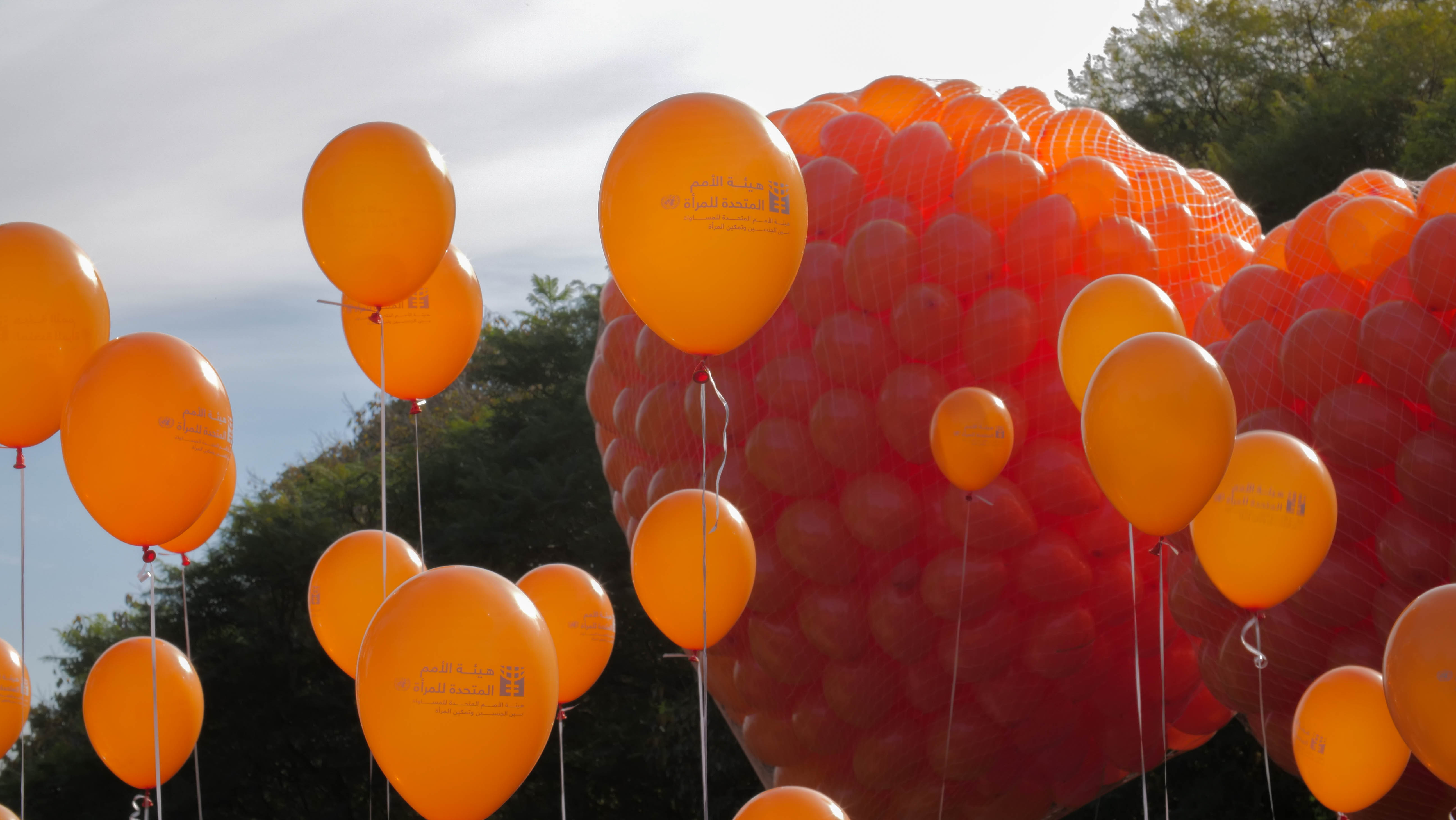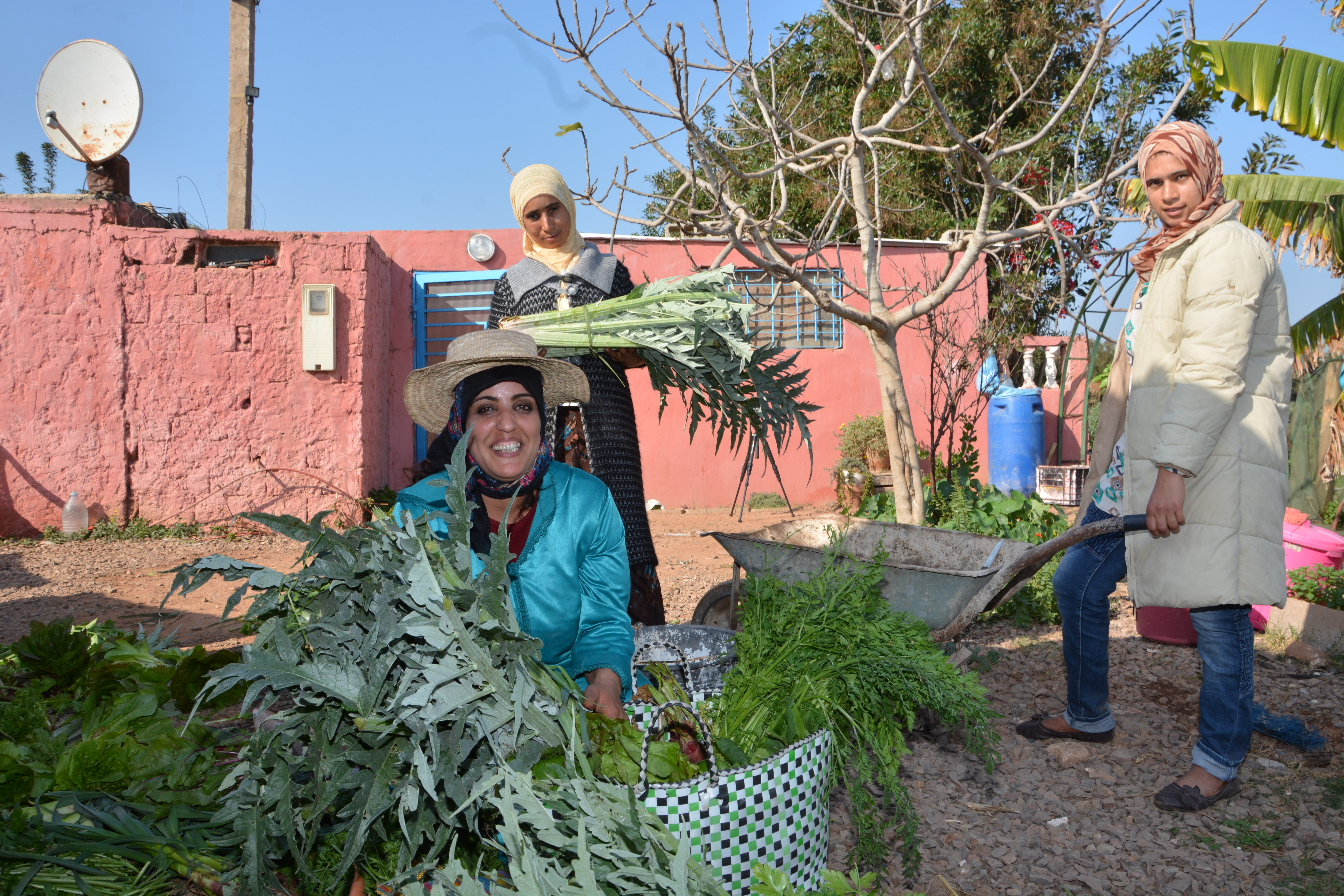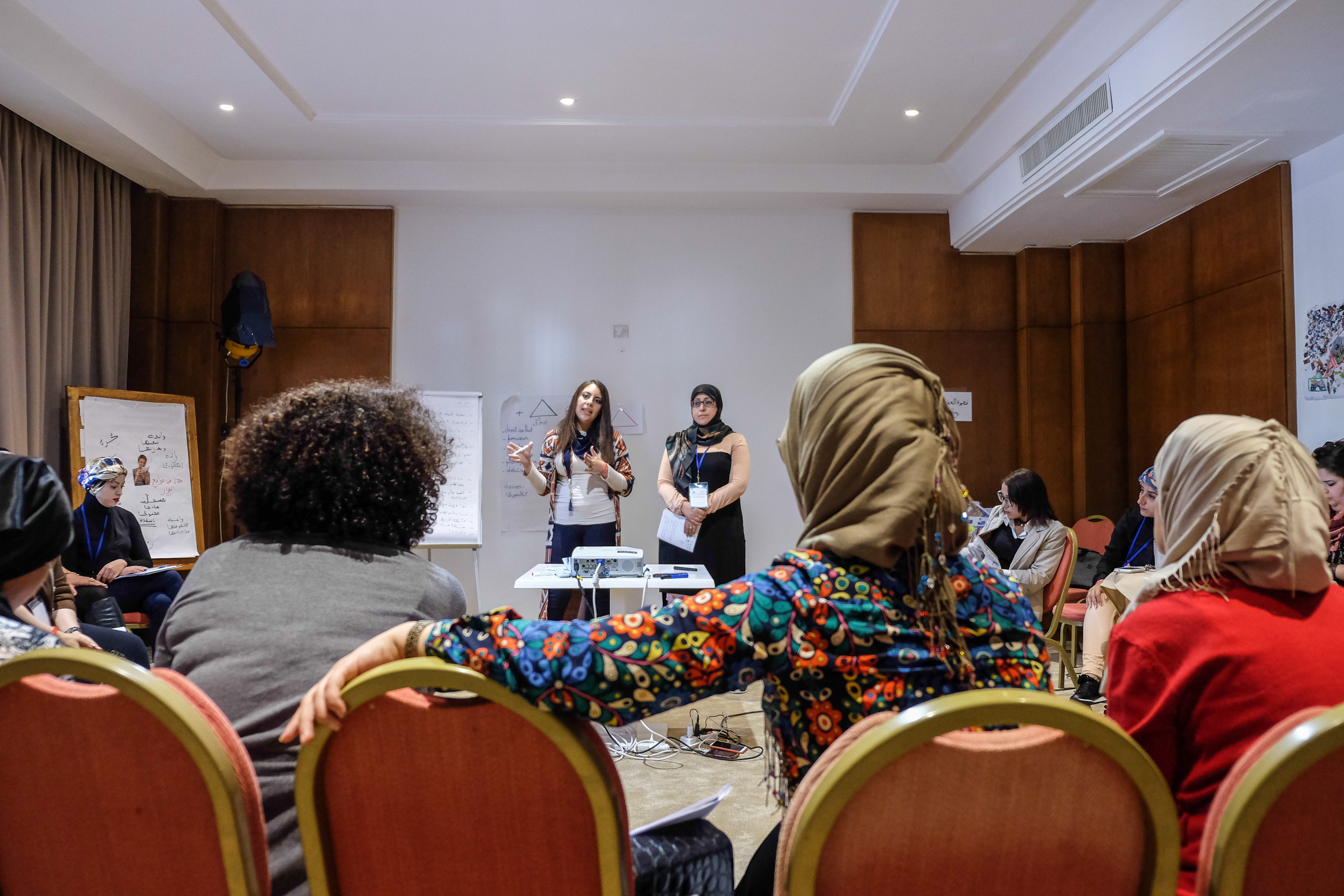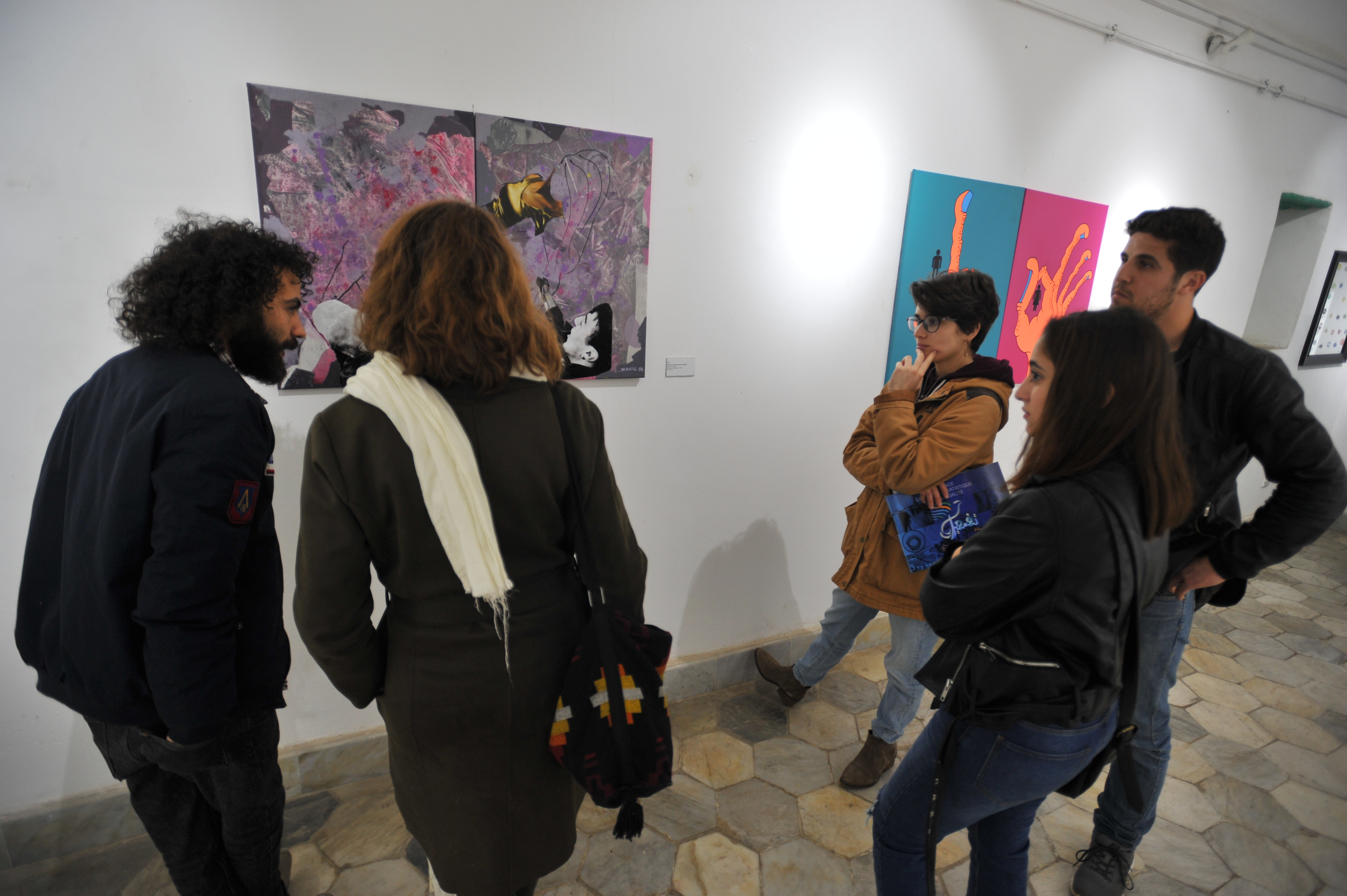Areas of work and programmes - Maghreb
Morocco
Ending Violence Against Women (EVAW)

Safe Cities Marrakech
UN Women launched a city-wide initiative in 2014 in Marrakech, as part of its Global Flagship Programme Initiative Safe Cities and Safe Public Spaces, with support from the Spanish Agency for International Development Cooperation (AECID), and in collaboration with city and regional authorities, women’s groups and UN partners. The programme engages people from all sectors of society—from city officials to transportation workers and media professionals—to understand where and how women feel most vulnerable, who the perpetrators are, and what kind of interventions would be most effective.
Safe Cities Rabat
With support from UN Women, four local NGOs - Association Fraternité, Fondation Ababou, Centre Culturel Africain du Maroc and Association Jossour Forum des Femmes Marocaines - developed transformative initiatives towards empowering women for the defense of their rights and changing attitudes and behaviors to promote women’s and girls’ rights to enjoy public spaces free from violence. The city of Rabat developed pilot interventions, including the establishment of an Equity, Equal Opportunities and Gender Approach Entity, a local mechanism to ensure gender mainstreaming in local decision-making processes.
Enhanced Prevention and Response to Violence Against Women in Morocco
The “Enhanced Prevention and Response to Violence against Women in Morocco” programme seeks to strengthen and promote women’s human rights within the legal and institutional frameworks, and to create an environment that is supportive to women and girls that are survivors of violence through providing quality essential services that are available and accessible for all alongside transforming mentalities towards greater support for gender equality. To this end, UN Women partners with a wide array of government and civil society organizations, including Members of Parliament, the Chief Prosecutor’s Office, the National Mutual Aid, the Ministry for Equality, the Ministry of Health, the High Commission for Planning, local governments, religious actors, Bar Associations; as well as innovative partnerships, such as with taxi and bus drivers, transportation companies, and street peddlers, to advance the prevention of gender-based violence and the provision of essential services to survivors of violence.
Access to judicial services for women and children victims of human trafficking in Morocco
The project “Access to Judicial Services for Women and Children Victims of Human Trafficking in Morocco” is currently in its second phase. With the support of the Swiss Agency for Development and Cooperation, UN Women endeavors to strengthen the protection of women and children survivors of human trafficking, through implementing coordination mechanisms among national stakeholders, including the Chief Prosecutor’s Office and civil society organizations, raising the general public’s and the relevant stakeholders awareness on human trafficking and the exploitation of women and children, and building the capacity of the Chief Prosecutor’s Office to combat human trafficking and to improve the survivors’ legal protection. Among other outputs, UN Women has produced in 2015 an extensive study on human trafficking and the existing institutional response to this phenomenon and trained 253 Judges and 135 social workers on human trafficking, the country’s international obligations, and their respective roles in combatting human trafficking.
Men and Women for Gender Equality
The “Men and Women for Gender Equality” programme seeks to better understand the root causes of gender inequalities in the Arab States and to address them through an innovative bottom-up approach, including through the engagement of men and boys for gender equality. This regional programme has specific focus on Egypt, Lebanon, Morocco and Palestine and is funded by the Swedish International Development Cooperation Agency (Sida). As part of this programme, UN Women collaborated with Promundo and local research partners to conduct the International Men and Gender Equality Survey “IMAGES”, the first multi-country study in the MENA region to take a wide-angle lens to the lives of women and men and their attitudes towards gender equality. UN Women worked with the scholars’ association Rabita Mohammedia des Oulémas to produce a study on the concept of “Qiwamah”, commonly invoked to justify gender inequality.
IMAGES
IMAGES MENA Morocco reveals a changing world of gender and points to a wide array of attitudes and behaviour throughout the region of Rabat-Salé-Kénitra.
The patriarchal system is clearly under pressure – with unpredictable results. On the one hand, while rates of domestic violence – husband-wife or parent-child – remain high, education is helping to reduce men’s use of such measures, and men and women alike speak of physical spousal violence as a declining phenomenon. While men still do little in the way of housekeeping, and claim a dominant role in household decision-making, the more educated among them are ready to share the load.
Leadership and Governance
Promoting and strengthening the institutionalization of equity and gender equality in the civil service
The “Promoting and Strengthening the Institutionalization of Gender Equity and Equality in the Civil Service” programme, implemented since 2011 in collaboration with the Ministry of the Reform of the Administration and the Civil Service, seeks to advance the equal representation of men and women in the civil service and strengthen gender mainstreaming in civil service reform. The strategy of this programme is to optimize the impact of the Ministry’s cross-cutting mandate to build human capital on an egalitarian basis to strengthen the recognition of equality as conducive to democracy, good governance, and modern public administration, and to mainstream gender equality in human resources management reforms, through both preventive and corrective measures. This programme has led to the creation of the Inter-Ministry Consultative Network for Institutionalizing Gender Equality in the Civil Service, the production of practical tools for Human Resources Managers to integrate gender equality into their practices, and the organization of three rounds of “Women and Leadership” training courses in Paris and Rabat.
Support to the parliamentarian parity and equality thematic group
A Regional Female Members of Parliament Network, the “Arab Female Parliamentarian Network for Equality”, was launched in 2014 and started in 2015. This network is considered a pioneering initiative, as it targets enhancing gender equality across the different thematic areas of concern. The network includes representation from the 22 countries in the Arab region. The qualitative analysis provided by the group helped support the adoption of quotas in national and local elections, now enshrined in the law. The group also supported the revision of the Parliament internal regulations, which now impose a quota of 1/3 of women in the decision instances at the House of Representatives.
Gender-sensitive local governance
The project “Gender-sensitive local governance” is part of a partnership agreement signed in 2014 with the Ministry of the Interior Directorate-General for Local Authorities (DGLA) to strengthen the integration of a gender-sensitive approach in territorial governance, in accordance with organic laws and their decrees.
Making every woman and girl count
Taking place within the framework of UN Women’s “Making Every Woman and Girl Count” flagship programme, this programme seeks to strengthen the production, the dissemination, and the use of gender-sensitive statistical data, through a partnership with the High Commission for Planning. Among other activities, UN Women provides technical expertise in support of the elaboration of an analytical study on the current state of gender-sensitive data in Morocco and supports the dissemination of the study’s results and recommendations to raise awareness among relevant stakeholders.
Equity and Gender Equality in Public Policy
The “Promoting and Strengthening the Institutionalization of Equity and Gender Equality in Public Policy” programme aims at supporting the institutionalization and dissemination of the principles of equity and gender equality through strengthening the capacity of the Social Affairs Division of the government, comprising the Ministry of Equality, the Social Development Agency, the National Mutual Aid, and the National Institute for Social Action, in the areas of intersectoral coordination, knowledge production, monitoring and evaluation, local social engineering, communication, and knowledge management. To achieve these goals, UN Women strengthens the knowledge of the main stakeholders and provide them with tools to build their capacity to mainstream gender into their strategies, provides technical expertise in support to the policies and programmes of the Social Affairs Division, facilitates the dissemination of good practices amongst the various stakeholders, and develops a structured communication strategy in support of the Ministry of Equality.
Economic empowerment

Supporting the economic empowerment of women through the promotion of the agro-ecological value chain for better resilience to climate change
In collaboration with The Coca Cola Foundation, UN Women worked on the project “Supporting the economic empowerment of women through the promotion of the agroecological value chain for a better resilience to climate change”. The project supports 50 women leaders and members of two agricultural cooperatives to become financially independent through the production of aromatic and medicinal plants (PAM) and olives in the regions of Essaouira and Ouarzazate, while promoting women’s green entrepreneurship and the protection of the environment.
Tunisia
Ending Violence Against Women (EVAW)
Combatting Violence against Women (VAW) and implementing essential packages of services for women survivors of violence
This programme aims at supporting national stakeholders’ commitment to prevent violence against women and girls and to deliver quality essential services to women survivors of violence, through strengthening the capacities of national and local authorities to adopt and implement comprehensive public policies to that effect and the capacities of gender equality advocates towards social mobilization to promote women’s right to live a life free of violence, and supporting cities and local stakeholders to adopt and implement local responses to develop safe public spaces. In line with these objectives, UN Women supports the implementation of the organic law on eliminating violence against women and the operationalization of intersectoral mechanisms led by key Ministries. UN Women’s partners include the Ministry of Women, Family, and Childhood, the City of Nabeul, as well as civil society organizations.
Leadership and Governance

Gender sensitive public policies and promoting access of women civil servant in decision-making positions
This programme aims to enable women to lead, participate in, and benefit equally from national and local gender-responsive and sensitive governance systems in Tunisia, through mainstreaming gender into public policies and supporting the reform of the normative framework, and through the production and use of accurate gender-sensitive data. In this respect, UN Women will build the coordination capacity of the Ministry of Women, support advocacy initiatives by members of parliament and civil society organizations and support the production of gender assessments of policies and programs addressing the needs of rural women in partnership with the national statistics institution and the Ministry of Agriculture.
Women, Peace, and Security
Women, Peace and Security in the Arab States (Tunisia)
The “Women, Peace and Security in the Arab States” regional programme, implemented by UN Women with the support of the Government of Finland, aims to take advantage of the global normative framework on women, peace and security to meet the gender and women's rights challenges facing countries affected by conflict and contribute to creating an enabling environment for the implementation of the UN Security Council Resoluton 1325. Under this programme UN Women in Tunisia supported the Government of Tunisia to develop and pass a Natioanl Action Plan on UN SCr 1325, passed in August 2018. UN Women is now working with the Government and civil society to support its implementation, and to ensure robust monitoring and reporting of progress.
Algeria

Support the effectiveness of rights' equality between men and women in Algeria
The “Support the Effectiveness of Rights’ Equality between Men and Women in Algeria” programme was launched in 2015 by UN Women and the Algerian government, with the support of the Belgian government. This programme aims to strengthen elected women’s participation in decision-making processes at the national, regional, and local levels, to prevent gender-based violence and to improve essential services provided to women and girls survivors of violence, and to lay down a culture of equality within the media and among young civil society activists. Among other activities, UN Women launched a survey on elected women’s opportunities and constraints, conducted training on leadership and electoral campaigns, and supported the organization of an international conference on the role of security services in eliminating violence against women. As part of this programme, UN Women partners with the Ministry of Interior and Local Government, the Ministry of National Solidarity, Family, and Women’s Status, the Ministry of Communication, and the media.